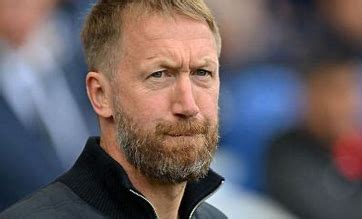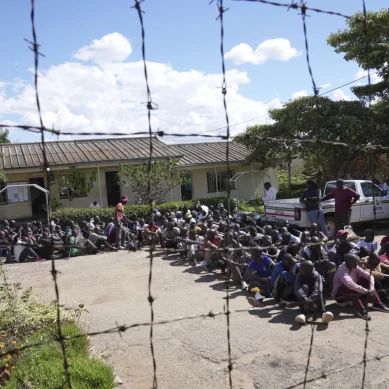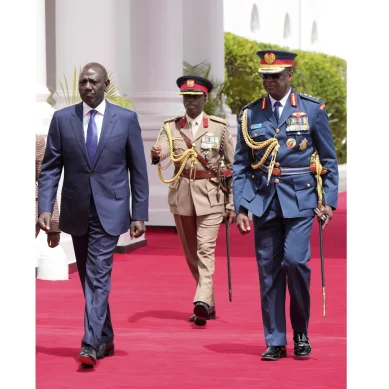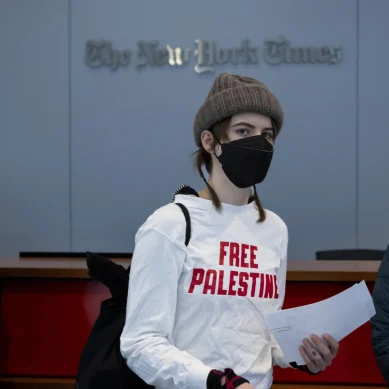
Two wins in 14 matches across all competitions for Chelsea since the first week of November. A run of form even bleaker than the final weeks of Jose Mourinho’s second spell at the club in 2015-16, when a Premier League title defence came to resemble an unthinkable relegation battle amid acrimony in public and “palpable discord” behind the scenes.
Back then, the daily tension around Cobham became so unbearable that members of staff were afraid to leave their offices and run the risk of encountering a wild-eyed, snarling Mourinho in the corridor. Graham Potter’s demeanour, it is fair to say, does not provoke the same reaction, although the individuals we spoke to for this story have still been granted anonymity to protect their jobs and relationships at Chelsea.
“Potter is affable, approachable,” says one club employee. “Not like a bear with a sore head. There are no barriers. He is obviously taking some of the personal abuse hard but I like how objective he is. Potter doesn’t cause any problems like other managers have in the past – he’s very down-to-earth, humble, intelligent, courteous.
“I’ve not sensed any negativity among the players, or vitriol. It feels more like ‘things are going wrong, we need to fix it’. It doesn’t feel like hatred or disillusionment. Walking around the corridors at Cobham, you don’t feel any tension or nastiness. Everyone is just getting on with it.”
There have been no crisis meetings or ramping up of tension. Potter even took the unusual step of giving his players two full days off in the wake of the Southampton loss and there will be no full first-team training session at Cobham on Thursday. Other coaches might have cracked the whip in similarly dire circumstances, but Potter is mindful of Chelsea’s devastating recent injury crisis and wary of overloading players who are still working their way back to peak condition.
As you can imagine, not everyone connected to the club has had a favourable impression of Potter’s debut season. One source close to a senior player, speaking anonymously to protect relationships, says, “From what I hear or gather, I don’t get the impression Potter is saying that much to the players. He doesn’t strike me as a personable character that says a lot.
“There are a lot of new faces, people speaking different languages, too. Potter hasn’t been there that long himself and so it’s going to be hard for him to implement his ideas. It can’t be easy.
“At Brighton, the expectation wasn’t there. The players there didn’t have any expectations either. But at Chelsea, you have all these big egos. People have to respect him as a man, as a coach and a lot of the players who have come in may not know that much about him, seen him or what he’s done. This is Chelsea, the dynamic is different.”
Co-owners Todd Boehly and Behdad Eghbali have personally expressed their support to Potter in recent weeks, and the highest-ranking people in Chelsea’s football operation at Cobham – co-sporting directors Paul Winstanley and Laurence Stewart, technical director Christopher Vivell and co-director of recruitment and talent Joe Shields – remain warm, friendly presences around the training ground.
All have officially moved into the building with offices assigned. The recruitment team are on the top floor, with Vivell, for example, moving into the room former technical director Michael Emenalo used before he left in 2017.
Potter and his assistants have been switched to the ground floor, closer to the players. All Chelsea managers used to be assigned a big office on the top floor, but Potter has had a room redecorated downstairs.
Chelsea’s first-team players also presented well at an open session at Cobham on Tuesday with a select group of fans in partnership with the club’s foundation and sponsors. Everyone in Potter’s squad came over to meet and greet after training, signing autographs and taking pictures – in marked contrast to bad spells in previous years, when Diego Costa and David Luiz often engaged but other high-profile stars were in no mood to participate.
Beyond the inevitable damage to confidence levels wrought by recent results, the picture that emerges is of a Chelsea squad divided by the circumstances of a chaotic past year and by vastly differing impressions of their futures within the bigger project at Stamford Bridge.
There is a genuine concern among some that many of the English contingent are going to be sold in the summer to help balance the budget after two transfer windows of incredible spending. This uncertainty is going to affect morale.
Among the survivors of the Roman Abramovich era, there is a pervading sense of bemusement as to the sweeping nature of the changes driven by Boehly and Eghbali since their takeover last May. Rewind a little more than 18 months and Chelsea were Champions League winners in Porto under the leadership of a world-class coach in Thomas Tuchel and had convinced themselves they were only an elite No 9 away from winning the Premier League again.
Romelu Lukaku’s signing for £97.5 million from Inter Milan on a huge five-year contract in 2021 is an ongoing disaster for the club, while Antonio Rudiger and Andreas Christensen were allowed to leave for nothing by the previous regime.
But none of those who remained foresaw Boehly and Eghbali leading the recruitment of 13 new first-team players, either permanently or on loan, across their first two transfer windows, or saw any need for such an extensive overhaul.
By bringing in so many new faces so quickly, as well as replacing Tuchel with Potter, many believe Chelsea’s new owners have taken the path of most resistance – a prolonged, painful rebuild following the unnecessary breakup of a team that could very recently call themselves world and European champions.
As one source close to a first-team player puts it, “Burning it all down and starting again makes sense if you’re Everton, but this is Chelsea.”
Boehly and Eghbali’s assessment of Chelsea’s squad was very different. Rudiger and Christensen’s departures, for Real Madrid and Barcelona respectively, meant the defence required immediate investment. The loss of Rudiger’s strong personality has been keenly felt in some quarters and it is thought he would not have allowed standards to deteriorate as badly as they have.
A longer-term succession plan was required for Jorginho a – popular figure whose deadline day departure to Arsenal caused some dressing room consternation – and N’Golo Kante in midfield, while most of the attackers in Tuchel’s squad had failed to consistently produce.
In addition, there was a desire to lower the age profile of the group while taking steps to bring the salary structure down to a more sustainable level.
It remains early days, but not everyone in the squad is convinced the new signings are all up to Chelsea standard, regardless of their price tags. There is, however, an understandable feeling (familiar to many who lived through the Abramovich era) that the new ownership’s high-profile acquisitions will be given priority when it comes to minutes on the pitch between now and May, at the expense of those who are deemed less central to the project moving forward.
Potter’s recent preference for January arrival David Datro Fofana over Pierre-Emerick Aubameyang in attack seems at first glance to be a classic example of this in action – although trusted recruitment analyst Kyle Macaulay’s data work is factored into the team selection process and Fofana is considered superior to Aubameyang in the most important metrics.
Within the squad, there is a level of sympathy for the challenge Potter faces after Chelsea’s winter recruitment drive. There are 31 players listed on the men’s first team page of the club’s official website and that formidably large list does not include promising academy graduate Lewis Hall, who has been given significant senior minutes (468 across all competitions) in recent months.
Six of those players are heading into the final year of their contracts this summer with varying degrees of uncertainty about their futures at Stamford Bridge.
Mason Mount headlines the group with talks paused over an extension after months of fruitless negotiations, but Mateo Kovacic and Ruben Loftus-Cheek are still waiting for the Chelsea hierarchy to initiate a conversation. Aubameyang and Christian Pulisic are both eyeing summer departures. Club captain Cesar Azpilicueta is in a separate bracket as he heads into his mid-30s, and the Spaniard is valued beyond his playing contribution.
It is, in every sense, a squad in transition, attempting to assimilate a raft of new players – many signed from outside the Premier League and some with limited English language skills – in the middle of a season. There are no bad characters, but no dominant personalities like Rudiger to galvanise everyone.
“They need to create a team now, not just a group of stars,” one source close to a first-team player says. “This is the most difficult step.”
The process has been hugely unsettling for everyone involved and Boehly and Eghbali are aware of this particular ripple effect of their aggressive rebuilding. This is at the root of their determination to remain patient and understanding with Potter, and at the very least grant him a full summer and preseason to work properly with a more settled, coherent group.
Unlike many of his Chelsea predecessors in bad times, Potter is not personally disliked by any of his players – even the ones he is not picking. He is widely regarded as a good, honest man who takes interest in them as people. There are, however, some doubts as to whether he is up to the task of arresting the club’s slide and, in the longer term, whether he is tactically capable of competing with Pep Guardiola and Jurgen Klopp as Tuchel did.
The owners’ support for Potter to date has been unwavering, but it is hard for some inside the club to believe his position will not be weakened considerably if there are no green shoots of recovery – in performances as well as results – at the tail end of this miserable season.
More immediately, the next three matches hold the potential to either disperse the gloom or ratchet the toxicity up to a new level: Tottenham Hotspur and Leeds United are fiercely disliked by supporters, while Borussia Dortmund’s visit to Stamford Bridge next month could prove the last meaningful game of the campaign.
Fail to win any of those and Potter’s rebuilding job will look more daunting than ever.
- The Athletic report











